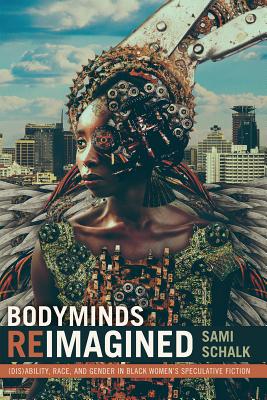 Dr. Sami Schalk’s recently published Bodyminds Reimagined: (Dis)ability, Race, and Gender in Black Women’s Speculative Fiction is a remarkable study on how race, gender and ability/disability are represented in speculative fiction. Her study focuses on speculative fiction written by black women, and approaches it from both a black feminist theory and disability studies perspective – these being Dr. Schalk’s academic fields.
Dr. Sami Schalk’s recently published Bodyminds Reimagined: (Dis)ability, Race, and Gender in Black Women’s Speculative Fiction is a remarkable study on how race, gender and ability/disability are represented in speculative fiction. Her study focuses on speculative fiction written by black women, and approaches it from both a black feminist theory and disability studies perspective – these being Dr. Schalk’s academic fields.
I say it’s remarkable, primarily, because of how revalatory it felt to me while reading it. It’s remarkable for other reasons, though. It’s an academic work (a monograph, in academic parlance) that is highly accessible to non-academics – like myself. It marries literary criticism with black feminist theory and disability studies, and provides extensive background and context so any reader, even those unfamiliar with the nuances of these fields, can understand what the author is trying to say. Finally, it uses speculative fiction as the mode to connect the theory to reality. It sounds somewhat ironic when you say it that way, but for those who view speculative fiction as another way to tell the truth about the world, like me, it really isn’t.
I feel supremely unqualified to review this book. So, this isn’t a review. Rather, it’s my way of letting people know this book exists and, perhaps, persuading a few of them to read it. For me, reading this book will have (and has already had) a profound impact on how I listen to and understand the stories people tell.
Dr. Schalk does an excellent job in the introduction providing the context needed to understand the rest of the book – how and why she choose this specific topic, how the book is layed out in terms of analysis, and through what critical lens that analysis occurs.
In the introduction of the book, she defines her two fields of study:
“Black feminist theory is an approach to interpreting, acknowledging, and tracing the effects of interlocking oppressions, particularly from the perspective of black women.”
“Disability studies is the interdisciplinary investigation of (dis)ability as a socially constructed phenomenon and systemic social discourse which determines how bodyminds and behaviors are labeled, valued, represented, and treated.”
She then discusses intersectionality, a key concept, and her specific use of it, as well as how Crip Theory, specifically, informs her work. I had never read anything about Crip Theory, so this turned out to be revelation number one.
After this excellent contextul introduction, the author makes this statement about the book, which I think encapsulates why people should buy and read this work:
Bodyminds Reimagined analyzes how representations of (dis)ability, race, and gender in speculative fiction force readers to question the ideologies undergirding these categories. I content that questioning the ideologies of (dis)ability, race, and gender in black women’s speculative fiction allows for a challenge to the attitudes, biases, and behaviors that result from them, as well as an exploration of their relationships to one another.
Finally, Dr. Schalk analyzes the following works in Bodyminds Reimagined:
- Octavia Butler’s Kindred
- Phyllis Alesia Perry’s Stigmata
- Octavia Butler’s Parable of the Sower and Parable of the Talents
- N.K. Jemison’s The Broken Kingdoms part of The Inheritance Trilogy
- Shawntelle Madison’s Coveted series
- Nalo Hopkinson’s Sister Mine
It’s not necessary for you to have read these books before reading Bodyminds Reimagined. Of these, I’ve only read Kindred (which is in my top 10 list of greatest books of all time – specultive or otherwise. If you have not read it, do it now!!!). I’m very much looking forward to making my way through each of the above titles with a greater understanding of the work than I would have previously.
I believe speculative fiction is a genre that uniquely challenges our perspectives and assumptions about the real world. Dr. Schalk’s book has not only reinforced the truth of this for me, but has also resulted in me reading fiction in a new way. It’s hard to explain exactly how, but I feel my literary landscape has expanded ten-fold just from reading this one book.
Bodyminds Reimagined is a book for people who love speculative fiction. It’s a book for people interested in understanding representation in fiction. It’s a book for people interested in representation in real life and what it means to participate in a culture that acknowledges the experiences and contributions of everyone. It’s a book for people interested in expanding their understanding of literature. And it’s a book for people who want to expand their understanding of the world.
That covers most of the people I know. I sincerely hope this book enjoys wide readership amongst speculative fiction enthusiasts and academics alike.
About Dr. Sami Schalk:
Dr. Sami Schalk is an Assistant Professor of Gender & Women’s Studies at University of Wisconsin-Madison.
Dr. Schalk’s interdisciplinary research focuses broadly on disability, race, and gender in contemporary American literature and culture, especially African American literature, speculative fiction, and feminist literature.
To learn more about Dr. Sami Schalk and her work, visit her website at samischalk.com.
Thank you for this introduction. I think it’s great to post non review reviews. I mean your response has a lot of value. PS I might put Parable of the Sower in my top 20. I thought it was better than Kindred.
Thanks for this comment, I appreciate it. And yes, Parable of the Sower is now def on my soon-to-read list. Since reading Dr. Schalk’s book it just keeps coming up, a sure sign I need to read it.